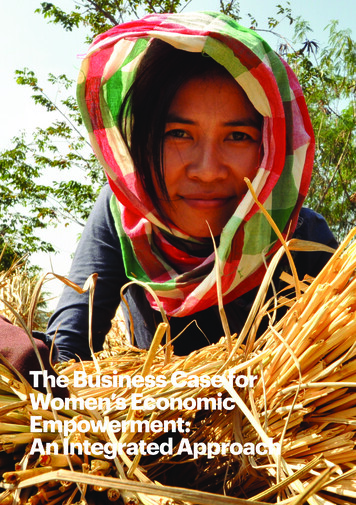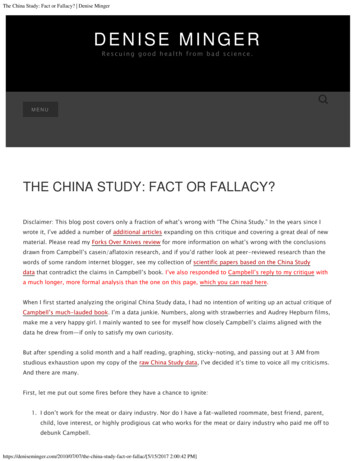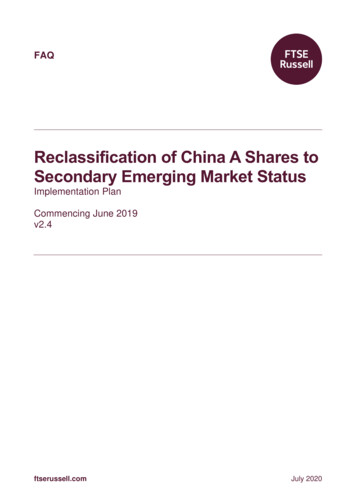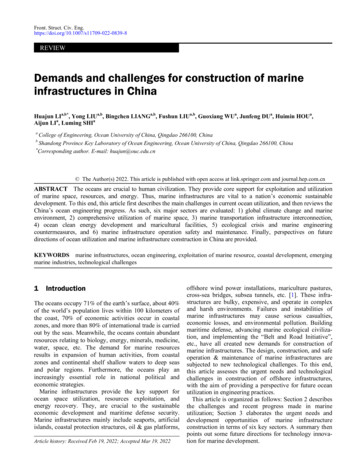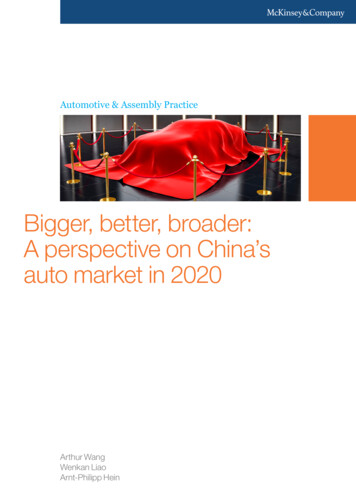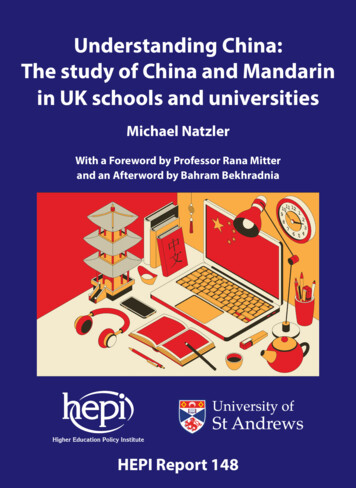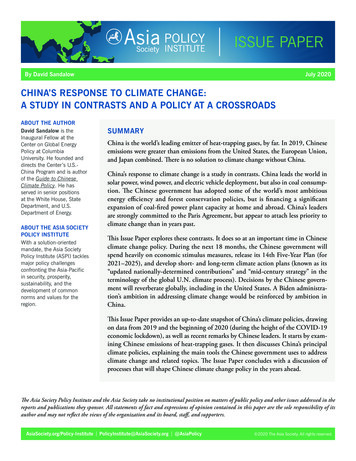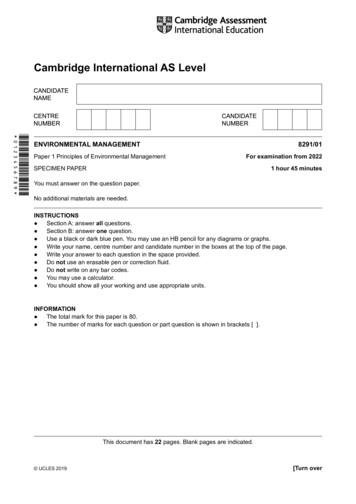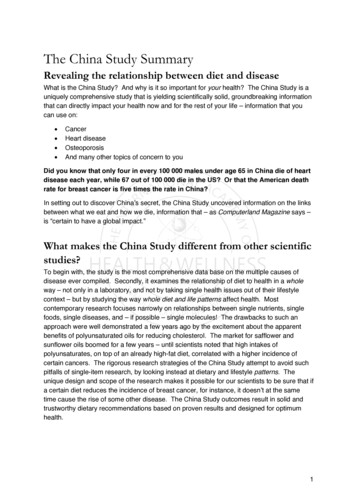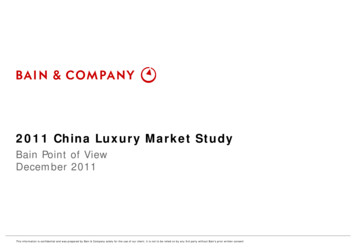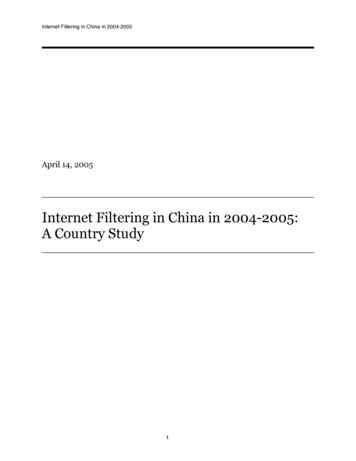
Transcription
Internet Filtering in China in 2004-2005April 14, 2005Internet Filtering in China in 2004-2005:A Country Study1
Internet Filtering in China in 2004-2005Internet Filtering in China in 2004-20051. Executive Summary. 32. Political, Technical, and Legal Context in China. 4A. Sensitive / Controversial Topics for Media Coverage . 4B. Internet Infrastructure and Access .5C. Legal Background. 8D. User Rights and Protections .183. Testing Methodology .19A. Methods .19B. Results Analysis . 20C. Methods Specific to China .21E. Topics Tested. 234. Results and Analysis . 23A. Summary . 23B. Proxy Testing Results . 24C. In-State Testing Results.27D. Overblocking . 42E. Mechanics of China’s Filtering . 45F. E-mail Filtering . 46G. Blog Filtering Testing .47H. Google Cache Testing . 48I. Filtering by Chinese Search Engines Baidu and Yisou . 49J. Restrictions on University On-Line Bulletin Board Systems . 50K. Restrictions on On-Line Discussion Forums .515. Conclusion . 52Appendix 1 . 53Appendix 2 . 54Appendix 3.55Appendix 4 . 582
Internet Filtering in China in 2004-20051. E X ECUT IVE S UM MARY 1China’s Internet filtering regime is the most sophisticated effort of its kind in the world.Compared to similar efforts in other states, China’s filtering regime is pervasive, sophisticated, andeffective. It comprises multiple levels of legal regulation and technical control. It involves numerous stateagencies and thousands of public and private personnel. It censors content transmitted through multiplemethods, including Web pages, Web logs, on-line discussion forums, university bulletin board systems,and e-mail messages. Our testing found efforts to prevent access to a wide range of sensitive materials,from pornography to religious material to political dissent. ONI sought to determine the degree to whichChina filters sites on topics that the Chinese government finds sensitive, and found that the state does soextensively. Chinese citizens seeking access to Web sites containing content related to Taiwanese andTibetan independence, Falun Gong, the Dalai Lama, the Tiananmen Square incident, opposition politicalparties, or a variety of anti-Communist movements will frequently find themselves blocked. Despiteconventional wisdom, though, ONI found that most major American media sites, such as CNN, MSNBC,and ABC, are generally available in China (though the BBC remains blocked). Moreover, most sites wetested in our global list’s human rights and anonymizer categories are accessible as well. While it isdifficult to describe this widespread filtering with precision, our research documents a system thatimposes strong controls on its citizens’ ability to view and to publish Internet content.Unlike the filtering systems in many other countries, China’s filtering regime appears to becarried out at various control points and also to be dynamic, changing along a variety of axes over time.This combination of factors leads to a great deal of supposition as to how and why China filters theInternet. These complexities also make it very difficult to render a clear and accurate picture of Internetfiltering in China at any given moment. Filtering takes place primarily at the backbone level of China’snetwork, though individual Internet service providers also implement their own blocking. Our researchconfirmed claims that major Chinese search engines filter content by keyword and remove certain searchresults from their lists. Similarly, major Chinese Web log (“blog”) service providers either prevent postswith certain keywords or edit the posts to remove them. We found also that some keyword searches wereblocked by China’s gateway filtering and not the search engines themselves. Cybercafés, which provide animportant source of access to the Internet for many Chinese, are required by law to track Internet usageby customers and to keep correlated information on file for 60 days. As a further indication of thecomplexity of China’s filtering regime, we found several instances where particular URLs were blocked1The OpenNet Initiative is a collaborative partnership between three leading academic institutions: the Citizen Lab atthe Munk Centre for International Studies, University of Toronto, Berkman Center for Internet & Society at HarvardLaw School, and the Advanced Network Research Group at the Cambridge Security Programme (Centre forInternational Studies) at the University of Cambridge. As with all OpenNet Initiative work, these reports represent alarge team effort. The work of principal investigators Jonathan L. Zittrain and John G. Palfrey, Jr. on this researchreport was made possible by a grant from the John D. and Catherine T. MacArthur Foundation’s Research andWriting Grants Program of the Program on Global Security and Sustainability. ONI thanks Che Dong, AlanaMaurushat, Rebecca Vaughn, and a number of anonymous volunteers for contributing key research to this study.3
Internet Filtering in China in 2004-2005but the top-level domain of these URLs was accessible, despite the fact that the source of contentappeared consistent across the domain – suggesting that filtering may be conducted at a finer level inChina than in the other countries that we have studied closely. Moreover, China’s Internet filteringappears to have grown more refined, sophisticated, and targeted during the years of ONI’s testing.China’s intricate technical filtering regime is buttressed by an equally complex series of laws andregulations that control the access to and publication of material online. While no single statutespecifically describes the manner in which the state will carry out its filtering regime, a broad range oflaws – including media regulation, protections of “state secrets,” controls on Internet service providersand Internet content providers, laws specific to cybercafés, and so forth – provide a patchwork series ofrationales and, in sum, massive legal support for filtering by the state. The rights afforded to citizens asprotection against filtering and surveillance, such as a limited privacy right in the Chinese Constitution,that otherwise might provide a counter-balance against state action on filtering and surveillance, are notclearly stated and are likely considered by the state to be inapplicable in this context.China operates the most extensive, technologically sophisticated, and broad-reaching system ofInternet filtering in the world. The implications of this distorted on-line information environment forChina’s users are profound, and disturbing.2. P OLITICA L , T ECH NICA L , A ND L EGA L C ONT E XT IN C HINAA. Sensitive / Controversial Topics for Media CoverageIn China, a wide range of topics are considered sensitive or controversial by the government.Media are heavily controlled and journalists are frequently punished for publishing information or statingpositions that deviate from official Communist Party doctrine.2 Organized dissent and criticism of theCommunist Party are not tolerated.3 Coverage of any group that can organize large numbers of people isconsidered threatening. The Falun Gong spiritual movement, in particular, has been targeted forrepression in recent years.4In general, China attempts to suppress publication of information related to “subversive” politicalmovements and controversial state actions, including the Tiananmen Square uprising,5 support for a freeTibet,6 the Falun Gong spiritual movement,7 criticism of China’s human rights and social justice records,82He Qinglian, Media Control in China, Nov. 4, 2004, at http://www.hrichina.org/public/contents/8991.3He, Media Control in China.4Economist Intelligence Unit, Country Profile 2005: China at 18.5Human Rights Watch, World Report 2005: China, January 2005, .htm.6Jonathan Zittrain & Benjamin Edelman, Internet Filtering in China, IEEE Internet Computing, March/April 2003,available at http://unpan1.un.org/intradoc/groups/ public/documents/APCITY/UNPAN011043.pdf.7Zittrain & Edelman, Internet Filtering in China.4
Internet Filtering in China in 2004-2005independent news media,9 and pro-democracy / pro-Western commentary.10 Calls for decreasedcensorship are often themselves censored.11 Journalists who report on unfavorable events or question theparty line are often jailed on fabricated charges meant to discredit them.12 Additionally, the state activelysuppresses “inappropriate” material including pornography, sex-related information, and obscenity.13Methods of circumventing Internet filters and content restrictions are also censored.14While China stopped subsidizing newspapers and magazines in 2003, the state still tightlycontrols the media sector.15 Foreign companies cannot invest in newspapers and must enter intopartnerships or licensing agreements with Chinese firms to publish magazines.16 While the governmentgenerally controls what is published, it is stricter in some areas than others.17 Journalists andcommentators often cannot know the boundaries for prohibited expression, and the risk of losing theirjobs and facing civil or criminal liability leads to self-censorship.18B. Internet Infrastructure and AccessAccording to the most recent study by the China Internet Network Information Center (CNNIC),China has 94 million Internet users, nearly half of whom have broadband access.19 Other studies estimate130 million users by counting those who do not have a computer in their home but access the Internetfrom cybercafés.20 China has international bandwidth capacity measuring 74,429 megabits per second.Almost 60 million unique Internet protocol (IP) addresses have been assigned to computers in China.21China’s Internet regulatory policy authorizes four state organizations — now subsumed into theMinistry of Information Industry (MII) — to operate networks connected to the global Internet.22 The8See, e.g., Reporters Sans Frontières, Reformist Journalists and Intellectuals Punished and Censored, Dec. 3, 2004,at http://www.rsf.org/article.php3?id article 12008.9Zittrain & Edelman, Internet Filtering in China.10China’s influence extends even to broadcasters outside the state. See, e.g., Reporters Sans Frontières, Chineselanguage NTDTV harassed by Beijing, May 25, 2004, at http://www.rsf.org/article.php3?id article 10439.11See, e.g., Reporters Sans Frontières, Five Resign From Editorial Board in Solidarity With Dismissed MagazineEditor, Dec. 6, 2004, at http://www.rsf.org/article.php3?id article 11726.12He, Media Control in China, at 19.13See, e.g. Nation’s Fierce Smut Wars Wages Onward, China Daily, tent 2494594.htm.14Censorware Project, SafeWeb Privacy Proxy Censored in China, Mar. 14, 2001, athttp://censorware.net/article.pl?sid 01/03/14/0755209.15Xinhua News Agency, Print Media Reform Involves 2000 Newspapers, 9000 Magazines, China Daily, Nov. 27,2003, at tent 285360.htm.16BusinessWeek Magazine, Foreign Magazines Facing China’s Newsstand Fever, China Daily, Nov. 5, 2003, ontent 278774.htm.17Economist Intelligence Unit, Country Profile 2005: China at 2918He, Media Control in China.19thChina Internet Network Information Center (CNNIC), 15 Statistical Survey Report on the Internet Development inChina, January 2005, at df.20Net User Tally in China Nears 134m, South China Morning Post, Feb. 4, 2005, id 20477.21thCNNIC, 15 Statistical Survey Report on the Internet Development in China.22Asian Technology Information Program, Report ATIP98.090: The Internet In China, Nov. 3, 1998, 8.090r.html.5
Internet Filtering in China in 2004-2005MII oversees China’s Internet infrastructure; physical access is provided by nine state-licensed Internetaccess providers (IAPs), each of which has at least one connection to a foreign Internet backbone.23 IAPspeer at three Internet exchange points (IXPs) run by the state.24 IAPs grant regional Internet serviceproviders (ISPs) access to backbone connections. Over 620 ISPs were registered in July 2001, and farmore exist today.25Figure 1 - Internet Access Providers26Company NameAudienceNetwork NameBandwidth(Mb/s)China TelecomGeneral publicCHINANET46268China Netcom/CNCNetBroadbandCHINA16919087usersChina Science and Technology NetworkResearchersCSTNET5275China UnicomBusinessesUNINET1645CMNET1130CERNET1022China Intl. Economic and Trade NetCIETNET2China Great Wall CommunicationsCGWNETUnderChina MobileChina Education and Research NetworkSchoolsconstructionChina SatcomCSNETUnderconstructionThe MII regulates ownership and operation of telecommunications services; the Ministry refusedto allow foreign companies to offer Internet access in competition with China’s ISPs until China wasaccepted for entry into the World Trade Organization in 2001.27There has been considerable debate about the complicity of Western corporations in thedevelopment and maintenance of China's filtering system. China’s Internet infrastructure includesequipment and software from U.S. companies, including Cisco Systems, Nortel Networks, SunMicrosystems, and 3COM. 28 Cisco Systems in particular has been integral to China’s Internet23CNNIC, 15 Statistical Survey Report on the Internet Development in China.24thCNNIC, 15 Statistical Survey Report on the Internet Development in China.th25Human Rights Watch, Freedom of Expression and the Internet in China, 701.htm.26thCNNIC, 15 Statistical Survey Report on the Internet Development in China.27Carolyn Duffy Marsan, China: ISPs Report Major Growth in 2004, Network World Fusion, Dec. 20, 2004, 0isp1.html.28Asian Technology Information Program, Report ATIP98.090: The Internet in China See Greg Watson, China’sGolden Shield: Corporations and the Development of Surveillance Technology in the People’s Republic of China, athttp://go.openflows.org/ (2001) (describing how American and European technology was used to build China’s digitalsurveillance network); see also Ethan Gutmann, Losing the New China at 127-172 (2004).6
Internet Filtering in China in 2004-2005development. The core of China's Internet relies on Cisco technology; Cisco specifically implemented thebackbone networks for ChinaNet29 and CERNet30, China's nation-wide educational network. Cisco'sinvolvement continues to this day with the company’s role in the development of China's “NextGeneration Network,” known as CN2.31Activists and human rights organizations have for years charged Cisco and other Westerncorporations with actively assisting China in developing censorship and surveillance systems.32 Forexample, Amnesty International, Human Rights Watch, and Reporters Sans Frontières have consistentlyhighlighted the issues of corporate responsibility and Internet freedom raised by China’s use of Westerntechnologies. These groups allege that Western corporations have facilitated the construction of China’scensorship and surveillance infrastructure, and that they may even be involved in the system’s ongoingmaintenance and operations.33Companies such as Microsoft and Cisco respond to these charges by suggesting that they simplysell the technology to China; thus, they cannot and should not control how their customers use what theyhave bought.34 However, at least one whistleblower has stated that Cisco specifically designed anddeveloped a special router/firewall box for China.35In addition, the technologies that Cisco sold to China for backbone routing purposes -- Cisco12000 series routers -- have packet filtering capability, allowing the routers to filter bi-directionally at thepacket level and to implement up to 750,000 different filtering rules.36 These systems are designed tocombat various Internet attacks, including Denial of Service (DoS) attacks and the spread of worms andviruses. For example, to combat the Code Red worm, Cisco released instructions on how to configuretheir routers’ Access Control Lists to block the spread of the worm.37 These same techniques can beapplied to block political content. The particular technique described in Cisco’s Code Red document29Cisco Systems, Cisco Systems to be Key Supplier for Building China's Nation-Wide IP Backbone, Oct. 14, 1998,available at 30Cisco Systems, CERNET Strengthens Cooperation with Cisco Systems with Major Upgrade of National BackboneNetwork, Sept. 2, 1998, at 31Cisco Systems, Cisco Selected to Build Backbone and Premium Business Network for China Telecom's IP NextGeneration Network, Nov. 11, 2004, at http://newsroom.cisco.com/dlls/2004/prod 111104.html.32Greg Walton, China's Golden Shield: Corporations and the Development of Surveillance Technology in thePeople's Republic of China, available s/globalization/goldenShieldEng.html.33See, e.g., Amnesty International, People’s Republic of China: Controls tighten as Internet activism grows, Jan. 28,2004, at 04; Human Rights Watch, China Tightens InternetControls, Aug. 1, 2001, at http://www.hrw.org/press/2001/08/china-0801.htm; Reporters Sans Frontières, InternetUnder Surveillance: China, June 22, 2004, at http://www.rsf.org/print.php3?id article 10749; Rights & Democracy(International Centre for Human Rights and Democratic Development), Human Rights at Risk on the Cyberbattlefield: The Sale of Security & Surveillance Technology to China, at tm.34Laura Rohde, Companies defend against Chinese censorship charge, IDG News Service, Dec. 2, 2002, .35Ethan Gutmann, Who Lost China's Internet?, The Weekly Standard, Feb. 15, 2002, available athttp://www.weeklystandard.com/Utilities/printer preview.asp?idArticle 922.36Cisco Systems, Using Cisco 12000 Series IP Services Engine (ISE) Architecture to Enable the High-SpeedProvider Edge, Oct. 1, 2001, at odlit/werr wp.htm.37Cisco Systems, Using Network-Based Application Recognition and ACLs for Blocking the “Code Red” Worm, athttp://www.cisco.com/warp/public/63/nbar acl codered.shtml (last updated Apr. 6, 20057
Internet Filtering in China in 2004-2005focuses on blocking incoming and outgoing access to URLs that contain certain keywords in the path.However, one of the rules employed to block the Code Red worm, Match protocol http url“*root.exe*”, could just as easily be Match protocol http url “*falun*”.38It is unlikely that Cisco would choose not to provide customer support or training for specificfunctionality of their products. Yet without official denial or confirmation, observers are left to speculateabout their direct involvement in China’s filtering regime.C. Legal BackgroundChina’s legal regulation of the Internet is extraordinarily complex. The legal regime comprisesrequirements and prohibitions issued by multiple bodies and administrative agencies; our researchindicates that at least a dozen entities have authority over Internet access and content in some form.39These rules frequently overlap and restate prior provisions. Conforming to these requirements is mademore difficult by the broad, sweeping definitions that many regulations employ. Overall, China’s legalcontrols over the Internet have expanded greatly since 2000, indicating increased attention to thismedium of communication. Moreover, the number of regulatory bodies with a role in Internet control hasincreased. This may indicate intra-governmental competition for a voice in shaping a medium viewed asvital to China’s economic growth and political stability.1. General Media RegulationA number of regulatory agencies combine to control tightly China’s print and broadcast media.The General Administration of Press and Publication (GAPP) licenses and closely monitors publications,including newspapers, periodicals, books, and Web sites.40 GAPP is assisted by the GeneralAdministration for Customs, which confiscates publications deemed “harmful to the government.”41China’s State Administration of Radio, Film, and Television regulates radio, television, satellite, andInternet broadcasts 42, in conjunction with the Ministry of Information Industry, which retainsresponsibility for control of the telecommunications and software industries and Internet contentprovider licensing. The Ministry of Public Security is responsible for general regulation of Internet38Cisco Systems, Using Network Based Application Recognition and Access Control Lists for Blocking the "CodeRed" Worm, available at http://www.ccert.edu.cn/upload/1/35.pdf.39See Appendix 2 for a list of these bodies.40Congressional – Executive Commission on China, Freedom of Expression – Laws and Regulations, s.php#clampdown (translating “Notice Regarding ResolutelyClamping Down on Illegal Publishing Activities” of Jan. 25, 1996).41Regulations on Customs' Administration of Printed Materials and Audio/Visual Materials Imported or Exported byIndividuals Via Carriage or Post, July 10, 1991, translation available s.php.42See, e.g., Measures on the Administration of Foreign Satellite Television Channel Reception, Aug. 1, 2004;Measures on the Administration of Broadcasting Audio/Visual Programs over the Internet or Other InformationNetworks, Jan. 7, 2003, translations available at php; seegenerally Richard Cullen & Pinky D. W. Choy, The Internet in China, 13 Colum. J. Asian L. 99, 116 (1999).8
Internet Filtering in China in 2004-2005access.43 The State Secrecy Bureau classifies state secrets, which all citizens are required to “safeguard.”44Finally, the Central Propaganda Department ensures that Chinese publishers print only materialconsistent with the Communist Party’s ideology; the Department uses directives, screenings, and trainingsessions for publishers and their employees to accomplish this goal.452. Internet Access RegulationChina implements access controls for ISPs, ICPs, Internet subscribers, and cybercafé users.Access control has always been part of China’s Internet filtering system: in February 1994, one year beforethe Internet became commercially available to Chinese users, the State Council gave the Minister of PublicSecurity overall responsibility for supervision of the Internet.46Regulation of Internet access has grown more comprehensive, specific, and extensive recently.On March 2, 2000 the State Council promulgated “Interim Procedures on Registration and Filing ofOnline Business Operations”47 which, for the first time, explicitly recognized on-line businesses andrequired them to register and submit information on their personnel for “information checks.”48 InSeptember 2000, the “Interim Measures on the Administration of Record and Registration of Profitmaking Websites” formalized registration procedures, instituted annual inspections of on-line businesses,and required all such businesses to list their registration number prominently on their Web sites. Inaddition, the State Council issued Order No. 292, “Measures on Internet Information Services,” onSeptember 25, 2000.49 This order reiterated and strengthened provisions contained in previouslegislation, while establishing increased levels of control and enforcement. Specifically, Order 292attempted to differentiate Web sites that provide information “involving the journalism, publication,education, medical care, medicines, and medical equipment and so on” -- both for-profit and non-profit -from other Internet businesses.50a. ISPsISPs that want to provide service in China must obtain an operating license from MII.51 Accessproviders must record a customer’s account number, phone number, and IP address, and Internet content43See Human Rights Watch, Freedom of Expression and the Internet in China, 701.htm; see also Congressional – Executive Commission onChina, China’s Censors, at rs.php.44State Security Law, Feb. 22, 1993, translation available at php;see Congressional – Executive Commission on China, China’s Censors.45Congressional – Executive Commission on China, China’s Censors.46Regulations for the Safety Protection of Computer Information Systems, State Council Order No. 147.47Interim Procedures on Registration and Filing of Online Business Operations, State Council, Mar. 2, 2000.48Interim Procedures on Registration and Filing of Online Business Operations, Article 6; see Clara Liang, Red Light,Green Light: Has China Achieved Its Goals Through the 2002 Internet Regulations?, 35 Vand. J. Transnat’l L. 1417,1433 (2001).49Measures on Internet Information Services, State Council Order No. 292, Sept. 25, 2000, translation fromiSinoLaw.com.50Measures on Internet Information Services, Article 5.51China Online, Ministry Profile: Ministry of Information Industry (MII), archived /www.chinaonline.com/refer/ministry profiles/MIIL3.asp.9
Internet Filtering in China in 2004-2005providers that publish, operate bulletin boards, or engage in journalism must keep copies of all contentmade available.52 ISPs are legally responsible for content they display.53 ISPs that fail to follow the lawface revocation of their business license and arrest of company staff.54b. ICPsInternet content providers must control both access to and use of on-line bulletin board services.State Council Order No. 292 required for-profit Internet content providers (ICPs) to apply for a specialbusiness license55 and non-profit ICPs to file official records56. In addition, any ICP seeking to operate abulletin board system (BBS) would also need to apply for a special license.57 The “Provisions on theAdministration of Internet Electronic Messaging Services,” promulgated on October 27, 2000, by theState Council, built upon the licensing requirements established by Order No. 292.58 ICPs seeking tooperate bulletin boards or other electronic communication ser
B. Internet Infrastructure and Access According to the most recent study by the China Internet Network Information Center (CNNIC), China has 94 million Internet users, nearly half of whom have broadband access.19Other studies estimate 130 million users by counting those who do not have a computer in their home but access the Internet from cyberc.
